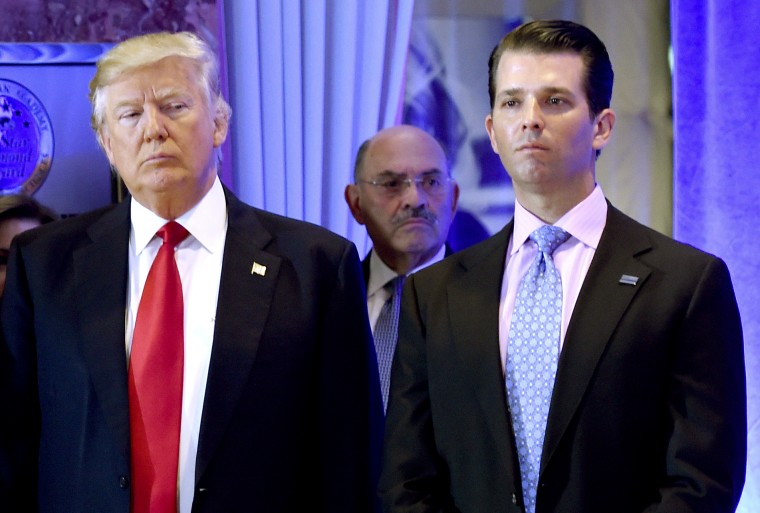The Trump Organization stands trial this week in what prosecutors allege was a 15-year scheme to compensate top executives of former President Donald Trump’s company “off the books” to help them avoid paying taxes — with the company's former chief financial officer appearing as the prosecution's star witness.
Jury selection began Monday, with potential panelists likely to be questioned intensely about whether they can be impartial in a case that involves the former president and his eponymous company.
An initial group of 132 potential jurors entered the courtroom to begin the screening process at about 11 a.m. ET. State Judge Juan Merchan told them the defendants are accused of a series of crimes, including tax fraud, and are alleged to have "devised and operated a long-term scheme to fail to report income on tax forms."
Merchan also said potential witnesses could include Trump, his sons Donald Trump Jr. and Eric Trump, and his daughter Ivanka Trump.
The initial number of potential jurors was whittled by more than half after several hours of questioning, in certain cases over associations with the Trump Organization or the prosecutor, an attorney for the defense said. There also “was a lot of bias” concerning the Trump Organization, the lawyer said.
The Trump Organization and Allen Weisselberg, its former longtime chief financial officer, were indicted last year after a yearslong investigation into the company's financial practices by the Manhattan district attorney's office. Weisselberg, 75, pleaded guilty to 15 felony charges in August.
As part of his plea agreement, the loyal Trump confidant agreed to pay nearly $2 million in taxes, interest and penalties, and serve five months in jail followed by five years of probation. He also agreed "to testify truthfully at the upcoming trial of the Trump Organization" or face a sentence of up to 5 to 15 years in prison, prosecutors said.
Manhattan District Attorney Alvin Bragg has said Weisselberg had used his position at the company “to bilk taxpayers and enrich himself,” and that his “plea agreement directly implicates the Trump Organization in a wide range of criminal activity and requires Weisselberg to provide invaluable testimony."
Trump is not charged personally in the case, and has blasted the investigation into his company and the charges against his longtime employee as part of a politically motivated "witch hunt."
The company said in a statement at the time of Weisselberg's plea that he was an “honorable man who, for the past four years, has been harassed, persecuted and threatened by law enforcement, particularly the Manhattan District attorney, in their never ending, politically motivated quest to get President Trump.”

Merchan, who is presiding over the trial in New York state Supreme Court in Lower Manhattan, shot down almost all the arguments presented by attorneys for the Trump Organization and Weisselberg in August, ruling that the evidence that was presented to the grand jury “was legally sufficient to support the charges in the indictment,” and that those proceedings were properly conducted and their “integrity unimpaired.”
The felonies that the indictment alleges the company committed include conspiracy, scheming to defraud, criminal tax fraud and falsifying business records.
Under New York law, the Trump Organization faces up to about $1.6 million in penalties if convicted on all counts. Legal experts have told NBC News that a conviction could also hamper the company's ability to obtain financing.
The indictment says the "scheme was intended to allow certain employees to substantially understate their compensation from the Trump Organization so that they could and did pay federal, state and local taxes in amounts that were significantly less than the amounts that should have been paid."
“The scheme also allowed the Trump Organization to evade the payment of payroll taxes that the Trump Organization was required to pay in connection with employee compensation,” the indictment said.
One of the biggest beneficiaries of the scheme was Weisselberg, who received $1.76 million in “indirect employee compensation” from the company, according to the charging document. That included a rent-free apartment, expensive cars, private school tuition for his grandchildren and new furniture.
The indictment did not name any of the other alleged beneficiaries, and only Weisselberg was charged.
The trial comes at an already perilous time for Trump and his company.
The former president is under investigation by the Justice Department for removing classified documents from the White House and hoarding them at his Florida resort, and by the Fulton County district attorney's office for possible 2020 election interference in Georgia.
New York Attorney General Letitia James, who assisted the Manhattan district attorney's office with its probe of the Trump Organization, filed a separate lawsuit against Trump and the company, charging they had overstated the company's financial assets by billions of dollars.
The suit seeks to impose about $250 million in penalties and to permanently bar Trump and his three oldest children from serving as officers of New York-based companies.
Trump, the company and his campaign are also being sued by a group of protesters who say they were roughed up by then-candidate Trump's security guards outside Trump Tower in 2015. That case is scheduled for trial in New York's Bronx County Supreme Court next week.


